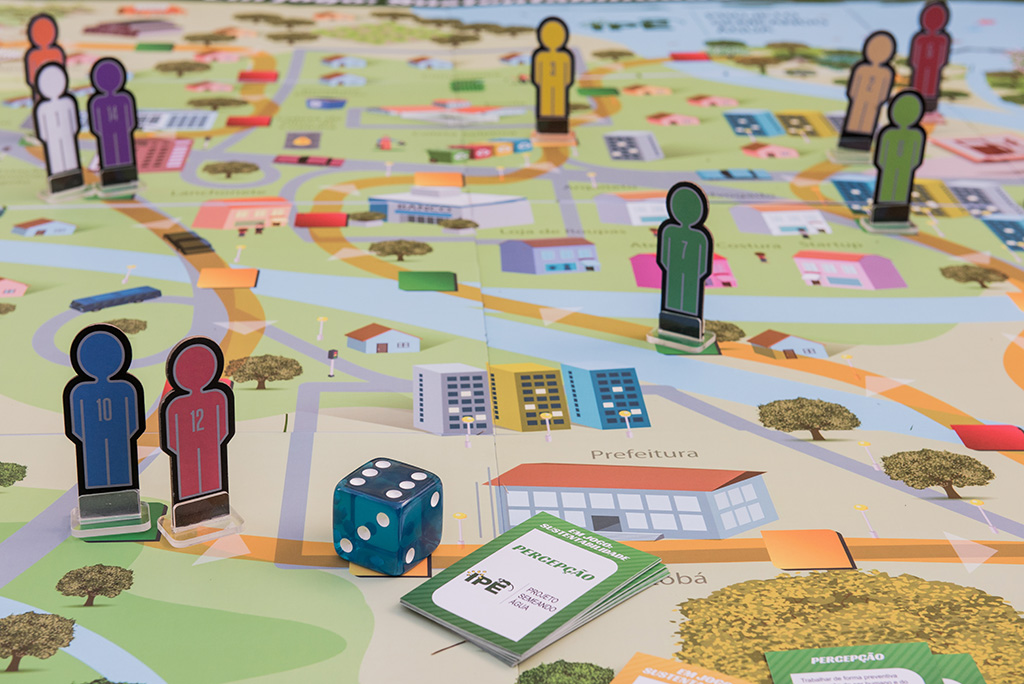Environmental Education
The Sowing Water Project mobilizes producers and students for Cantareira

Crédito: Ilana Bar/ Estúdio Garagem

A child writes and takes a letter about the World Environment Day (2019) to the employees of local companies that took part in the same action
Photo by Ilana Bar/Estúdio Garagem
Access to knowledge allows producers to make different choices. New ways of cultivating the land, taking care of springs, and managing animals align increased production with a better conservation of soil, water, and forest. And this is the knowledge that the Sowing Water Project provides and shares.
Also, through the Project’s actions, educators, children, and young people understand the role that local trees have in supplying water in quantity and quality, both for those who live in the region of the System and for those who are dozens, sometimes even about 100 kilometers away. They learn about the production of seeds in the nursery, the time these seeds take to grow, and planting techniques. After that, they start to look at the path between home and school differently.
To reach different audiences, the Environmental Education team of the Sowing Water Project relies on materials developed by the Communication team.
Learn about some of the strategies adopted to promote environmental education:

Sustainability in Game used in training with educators and meetings with leaders of local companies
- Training courses for producers on rural properties
- Lectures in schools, community centers, rural unions, and sustainable rural development centers
- Technical assistance to educators and rural producers
- Practical activities with students
- Guided visit to the nursery school at IPÊ (Institute of Ecological Research)
- Application of the “Sustainability in Game” tool in different audiences
- Awareness campaigns and distribution of seedlings of trees native to the Atlantic Forest and educational materials
Learn more about our work with:
Rural Producers
Rural producer: the country as an ally
Rural producers start the property planning with guidance from the Project’s team during a course for producers in the south of Minas Gerais
Photo by Cibele Quirino/Sowing Water Project
More than 200 rural producers and technicians have already attended the Sowing Water Project trainings. The courses are the main entry point for this public in the Project.
Many of these producers already concluded the technical assistance phase when they had the opportunity to develop the planning of their properties with a focus on environmental suitability. The benefits resulting from the transformation of the landscape improve the lives of rural producers and water security for the people in an area of 100 kilometers who receive water from the Cantareira daily.
The continuation of the Sowing Water Project aims to bring knowledge and better practices to more rural producers.
The training takes place on rural properties (Demonstratives Units) where you can check the results of the actions:
- Increased productivity
- Diversification of income sources
- Better soil usage
- Conservation of springs and waterways
The rural producers who participate in the training have the opportunity to talk to those investing in this direction.
Check out the video about Real Property X Ideal Property
Educators and Students
Educators and students: the growth of environmental knowledge

The Environmental Education Team of the Sowing Water Project gives elementary school children in Piracaia (SP) native tree seedlings to plant in public spaces

The education team of the Sowing Water Project participates, as a partner, in the planning meetings of the municipal education network of Nazaré Paulista (SP)
Photo by Environmental Education/Sowing Water Project
The actions carried out by the Sowing Water Project impacted the lives of more than 23,000 children and young people. The work developed with educators is the starting point to scale up the Project in the Cantareira region, and to mobilize students, in general, from public schools.
After the project presentation cycle in the municipal education offices, the Sowing Water Project’s team offers technical assistance to the educators’ projects. Thus, the themes worked with each group comply with the skills of the curriculum. Also, the challenges and achievements of the region are brought to the debate. In these conversations, the focus is on the importance of practical actions for advances in the local, regional, and global spheres.
The United Nations (UN) Sustainable Development Goals (SDGs) 2030 Agenda integrates content shared and discussed with educators.
Benefitted population
Benefitted population: awareness of the surroundings importance
 Children from Paulínia (SP) observe an experiment simulating water infiltration in areas with dense vegetation
Children from Paulínia (SP) observe an experiment simulating water infiltration in areas with dense vegetation
Photo by Cibele Quirino/Sowing Water Project
The Sowing Water Project’s team participates in a series of events to mobilize the population about local challenges and strategies capable of promoting transformations.
Materials developed by the Communications team – such as video, comics, almanacs, folders, and the Atlas of the Cantareira System – aim to explain to different sectors of society the strategic relevance of the region. The idea is that providers and beneficiaries of the Cantareira water can contribute.
Supporting tree plantations in the Cantareira System region and prioritizing food produced locally are just a few examples.
In the awareness campaigns, seedlings of trees native to the Atlantic Forest produced at the IPÊ nursery school, located in Nazaré Paulista, are distributed.

